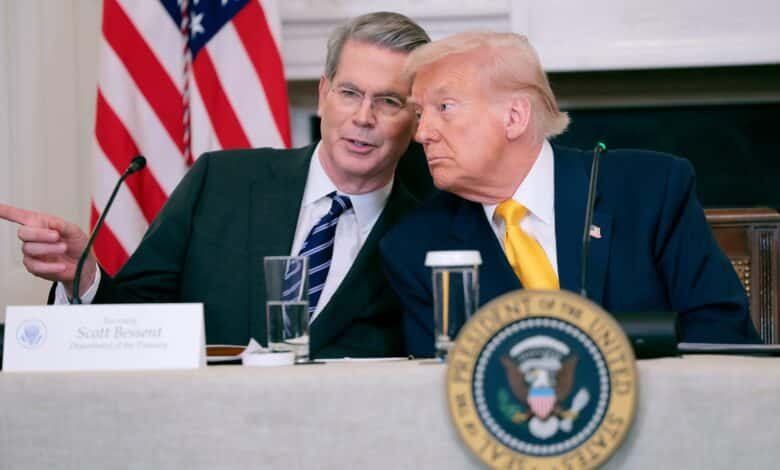“ Danger zone ”: Large weather companies while Trump prices fluctuate

The leaders of large companies, including Target, Goldman Sachs and Pepsi, have invoked the same Boogeyman in a word on recent calls of winnings: “uncertainty”.
The concerns among large and small businesses concerning the unstable commercial environment have focused on President Donald Trump’s pricing policies, which the White House has changed several times since Trump took office.
Last week, a pair of justice decisions pushed Trump’s most steep prices in the limbo, adding another layer of uncertainty as federal judges of the Court of Appeal determine if a large part of the policies adopted the legal rally.
In response to tariff changes, many American companies have chosen to put the job and investment plans likely to fear that a new tax may otherwise arouse regret, experts said in ABC News.
This paralysis risks sapping the momentum of the economy and switching to the United States in a slowdown, they added, while the recognition of the ultimate result remains uncertain.
“These fairly important policy changes – whether they leave the administration or the courts – may have a significant financial impact on businesses,” said Gregory Brown, a professor of finance at the University of North Carolina, in ABC News. “Profits can be transformed into losses, and vice versa.”
“It must be trying for those on the front line in terms of having their businesses or their very affected jobs,” added Brown.
The Trump administration has reprimanded criticism of its booming tariff approach, saying that flexibility offers White House officials to take advantage of trade negotiations with countries targeted by samples.
Addressing ABC News “this week” in April, the secretary of the Treasury Scott Bessent described posture as “strategic uncertainty”.
“You are not going to tell the person on the other side of the negotiation where you are going to find yourself. And no one is better to create this lever effect than President Trump,” said Bessent.
Meanwhile, a multitude of large companies have warned that they can undergo losses due to the lack of clarity.
The CEO of Target, Brian Cornell, warned “massive potential costs” last month due to prices, the implementation of difficulties posed by “the rates we face and uncertainty about the way these rates in different categories could evolve”.
In April, the CEO of Goldman Sachs, David Solomon, expressed an alarm on possible damage that could result from the troubled prospects.
“This uncertainty around the way and fears of potentially growing escalation of trade war has created significant risks for the American and global economy,” Solomon told analysts.
A survey on the confidence of CEOs fell at its lowest level since 2022, the Conference committee Found last month. More than half of the CEOs expect the conditions to aggravate over the next six months, the survey said.

The Treasury Secretary Scott Bessent and President Donald Trump looked at the White House Dining Room Summit in the White House dining room on March 7, 2025 in Washington, DC.
Anna Moneymaker / Getty Images, file
Political uncertainty puts companies in an obligation because it cannot assess the costs and advantages of significant long -term decisions, such as investment and hiring, Brett House, professor of professional practice at Columbia University and former deputy chief economist in Scotiabank, told ABC News.
“Companies still have risks before them. They can assess these risks in terms of loan or loan cost and prices for goods or services,” said House. “In a period of uncertainty, it is extremely frightening of commercial activity because there is almost now a means of anticipating the price of an activity.”
The uncertainty that companies face at an anxious moment for consumers. Consumer attitudes have embittered for four consecutive months as prices have settled, according to a survey by the University of Michigan.
Consumer expenditure, which represents about two -thirds of American economic activity, could weaken if buyers’ appetites decrease. In theory, a slowdown in expenses could hammer certain companies at the same time as they are trying to navigate the constantly evolving commercial environment, some experts said.
“If consumption is starting to decrease and companies do not invest, it is then that you are starting to see small parts of the gross domestic product to lower,” ABC News Jadrian Wooten, economics teacher at Virginia Tech University, told ABC. “We are in this danger area.”
The Federal Reserve Bank of St. Louis released A study in April which revealed a sudden increase in economic uncertainty could establish the conditions for an economic recession.
Until now, key measures of the economy have largely challenged fears of a slowdown.
The unemployment rate is at a historically low level and employment growth remains robust, although it has slowed down previous summits. In recent months, inflation has cooled, reaching its lowest level since 2021.
The organization of economic cooperation and development, or OECD, planned for growth on Tuesday continued to continue the American economy in 2025 and 2026, although a slower pace than last year. Wall Street recession forecasts have been blurred in recent weeks after Trump has canceled certain rates.
Brown, from the University of North Carolina, said that the uncertainty facing companies is undoubtedly, but its precise economic effect remains to be seen.
“Uncertainty is real,” said Brown. “How much it really materializes and really appears in data – it’s a different question.”





